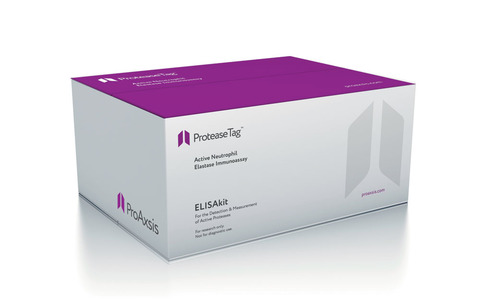
The ProteaseTag® Active Neutrophil Elastase Immunoassay, developed by Proaxsis, is now available from Diagenics. By targeting active neutrophil elastase, ProteaseTag® can provide an important assay relevant to a number of different respiratory conditions.
Climate change is increasing the amount of pollen and allergens produced by plants, augmenting mould proliferation and adding to the concentrations of outdoor ozone and particulate matter. All of these are important risk factors for respiratory disease and so assays that provide clinically pertinent information are important medical tools.
Proaxsis, a Netscientific portfolio company, have developed an assay, the ProteaseTag® Active Neutrophil Elastase Immunoassay, which specifically targets the active form of Neutrophil Elastase (NE). NE is a biomarker of infection and inflammation that has been shown to correlate with the severity of several important and debilitating respiratory diseases, such as chronic obstructive pulmonary disease (COPD) and bronchiectasis, as well as cystic fibrosis.
ProteaseTag® Active Neutrophil Elastase Immunoassay, available now from Diagenics, is the only assay that can specifically measure active NE in sputum and bronchial lavage samples. Although NE is not currently measured in clinics, it has long been used as an endpoint in those clinical studies aimed at evaluating the efficacy of new anti-elastase inhibitors or other anti-inflammatory therapies.
The measurement of active NE is important because increases in active NE levels have been associated with a shorter time to the next severe exacerbation, increased severity of exacerbation, and increased hospitalisation, in Bronchiectasis patients. Also there is an increase in active NE during exacerbation in COPD patients. Plus active NE levels in paediatric CF samples significantly correlate with age, IL-8 (a pro-inflammatory biomarker) and neutrophil count.
Measurement of active NE is therefore potentially a very useful diagnostic tool. All other commercially available ELISA-based systems are, however, compromised because they are unable to discern between active NE and NE that may be complexed with natural inhibitors. However, because, ProteaseTag® Active NE only targets the active biomarker, any risk of signal contamination by inhibited/AATcomplexed NE or other proteolytic species within complex samples is removed. ProteaseTag® Active Neutrophil Elastase Immunoassay therefore provides a sensitive and reproducible assay that has been clinically validated.






